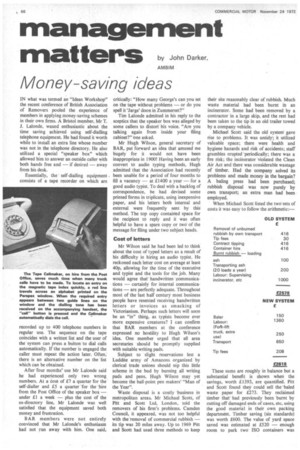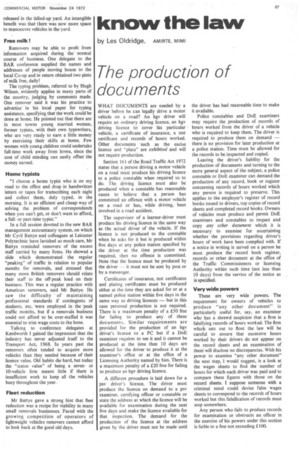management
Page 62

Page 63

If you've noticed an error in this article please click here to report it so we can fix it.
matters by John Darker,
AMBIM
Money-saving ideas
IN what was termed an "Ideas Workshop" the recent conference of British Association of Removers pooled the experience of members in applying money-saving schemes in their own firms. A Bristol member, Mr T.
Lalonde, waxed enthusiastic about the time saving achieved using self-dialling telephone equipment. He had found it worth while to install an extra line whose number was not in the telephone directory. He also utilized a special "speaker box" which allowed him to answer an outside caller with both hands free and — if desired — away from his desk.
Essentially, the• self-dialling equipment consists of a tape recorder on which are recorded up to 400 telephone numbers in regular use. The sequence on the tape coincides with a written list and the user of the system can press a button to dial calls automatically. If the number is engaged the caller must repeat the action later. Often,' there is an alternative number on the list which can be obtained.
After four months' use Mr Lalonde said he had experienced only two wrong numbers. At a Cost of £7 a quarter for the self-dialler and £5 a quarter for the tire from the Post Office of the speaker box — under £1 a week — plus the cost of the ex-directory line, Mr Lalonde was well satisfied that the equipment saved both money and frustration.
BAR members were not entirely convinced that Mr Lalonde's enthusiasm had not run away with him. One said, critically: "How many George's can you set on the tape without problems — or do you spell it large' doon in Zummerset?"
Tim Lalonde admitted in his reply to the sceptics that the speaker box was alleged by some callers to distort his voice. "Are you talking again from inside your filing cabinet?" one asked.
Mr Hugh Wilson, general secretary of BAR, put forward an idea that amused me hugely for it would not have been inappropriate in 1900! Having been an early convert to audio typing methods, Hugh admitted that the Association had recently been unable for a period of four months to fill a vacancy — at £1400 a year — for a good audio typist. To deal with a backlog of correspondence, be had devised some printed forms in triplicate, using inexpensive paper, and his letters both internal and external were frequently sent by this method. The top copy contained space for the recipient to reply and it was often helpful to have a spare copy or two of the message for filing under two subject heads.
Cost of letters Mr Wilson said he had been led to think about the cost of typed letters as a result of his difficulty in hiring an audio typist. He reckoned each letter cost on average at least 40p, allowing for the time of the •executive and typist and the tools for the job. Many would agree that handwritten communications — certainly for internal communications — are perfectly adequate. Throughout most of the last half century most business people have resented receiving handwritten letters or invoices as smacking of Victorianism. Perhaps such letters will soon be an "in" thing, as typists become ever more expensive creatures? I can confirm that BAR members at the conference expressed no hostility to Hugh Wilson's idea. One member urged that all area secretaries should be promptly supplied with suitable writing pads.
Subject to 'slight reservations lest a Luddite army of Amazons organized by clerical trade unions should nip this little scheme in the bud by burning all writing pads and pens, Hugh Wilson may yet become the ball-point pen makers' "Man of the Year".
Waste disposal is a costly business in metropolitan areas. Mr Michael Scott, of Pitt and Scott Ltd, London, told the removers of his firm's problems. Camden Council, it appeared, was not too helpful with the 'removal of commercial rubbish — its tip was 20 miles away. Up to 1969 Pitt and Scott had used three methods to keep their site reasonably clear of rubbish. Much waste material had been burnt in an incinerator. Some had been removed by a contractor in a large skip, and the rest had been taken to the tip in an old trailer towed by a company vehicle.
Michael Scott said the old system gave rise to problems. It was untidy; it utilized valuable space; there were health and hygiene hazards and risk of accidents; staff grumbles erupted -periodically; there was a fire risk; the incinerator violated the Clean Air Act and there was considerable wastage of timber. Had the company solved its problems and made money in the bargain? A baling press had been purchased; rubbish disposal was now purely by own transport; an extra man had been employed.
When Michael Scott listed the two sets of costs it was easy to follow the arithmetic:—
OLD SYSTEM
Removal of unburned
rubbish by own transport 416 Tip fees 30 Contract tipping 416 Container hire 416 Burnt rubbish — loading ash 100 Transporting ash (20 loads a year) 200 Labour: Supervising incinerator, etc 1000
These sums are roughly in balance but a substantial benefit is shown when the savings, worth £1393, are quantified. Pitt and Scott found they could sell the -baled waste paper for £273. They reclaimed timber that had previously been burnt by cutting off damaged ends of cases, etc, using the good material in their own packing department. Timber saving (six standards) was worth £600. The value of yard space saved was estimated at £520 — enough room to park two ISO containers was
released in the tidied-up yard. An intangible benefit was that there was now more space to manoeuvre vehicles in the yard.
Free milk !
Removers may be able to profit from information acquired during the normal course of business. One delegate to the BAR conference supplied the names and addresses of people moving house to the local Co-op and in return obtained two pints of milk free, daily!
The typing problem, referred to by Hugh Wilson, evidently applies in many parts of the country,judging by comments made. One remover said it was his practice to advertise in his local paper for typing assistance, specifying that the work could be done at home. He pointed out that there are in most towns young married women, former typists, with their own typewriters, who are very ready to earn a little money by exercising their skills at home. Few women with young children could undertake full-time work away from home, since the cost of child minding can easily offset the money earned.
Home typists "I choose a home typist who is on my road to the office and drop in handwritten letters or tapes for transcribing each night and collect them, duly typed, in the morning. It is an efficient and cheap way of solving the problem of correspondence when you can't get, or don't want to afford,. a fullor part-time typist."
In a full session devoted to the new BAR management accountancy system, on which Mr Cyril Battye and colleagues at Leicester Polytechnic have lavished so much care, Mr Battye reminded removers of the excess staff carried by many firms. He showed a slide which demonstrated the regular "peaking" of traffic in relation to popular months for removals, and stressed that many more British removers should relate their staff to the off-peak load on their business. This was a regular practice with American removers, said Mr Battye. He saw thedifficulty of maintaining professional standards if contingents of students, etc, were employed in the peak traffic months, but if a removals business could not afford to be over-staffed it was essential to trim wage costs to the bone.
Talking to conference delegates at Kenilworth I gained the impression that the industry has never adjusted itself to the Transport Act, 1968. In years past the removers often tended to acquire more vehicles than they needed because of their licence value. Old habits die hard, but today the "status value" of being a sevenor 10-vehicle firm means little if there is insufficient work to keep all the vehicles busy throughout the year.
Fleet reduction Mr Battye gave a strong hint that fleet reduction was a recipe for viability in many small removals businesses. Faced with the growing competition of operators of lightweight vehicles removers cannot afford to look back at the good old days.












































































































